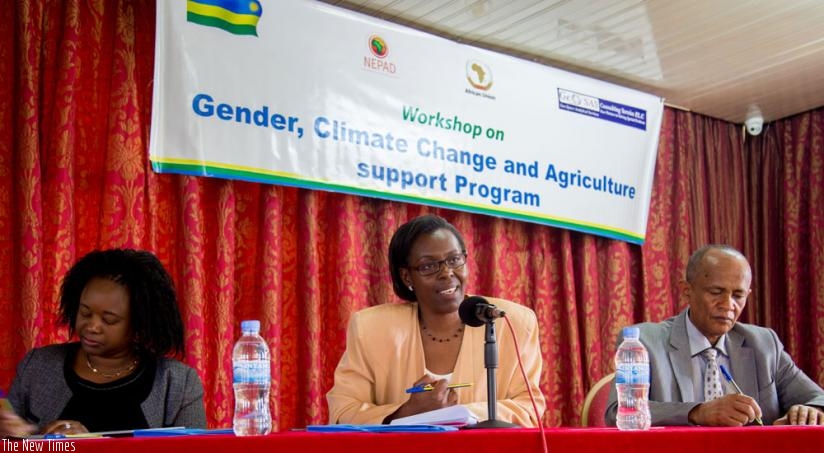Women Smallholder farmers are set to benefit from a new five-year project aimed at helping build resilience against effects of climate change.


Women Smallholder farmers are set to benefit from a new five-year project aimed at helping build resilience against effects of climate change.
The $14 million project, dubbed ‘Gender, Climate Change and Agriculture Support Programme’ (GCCASP-Rwanda), is led and jointly coordinated by the Ministry of Gender and Family Promotion and the New Partnership for African Development (NEPAD).
Speaking at a meeting yesterday, in Kigali, Henriete Umulisa, the permanent secretary at the ministry said the initiative will help empower women farmers who have perennially been marginalised in agriculture planning and decision making.
"Despite the critical role rural women play in agriculture and management of the family, their role in agriculture planning and decision making is marginalised,” she said.
"There is a great need to advance these problems to holistic projects and programmes that include improving food and nutrition security, increasing income for sustainable livelihoods and increasing their participation in all policy and decision making processes. And to ensure that all programmes are gender responsive,” she said.
Rural women and girls generally have limited access to productive assets including land, agriculture inputs, extension services and technology and micro projects.
They also have limited access to social protection and decent employment, an issue the project is expected to solve.
"This project is intended to tackle such problems through closing institutional gaps, capacity building of women smallholder farmers, creation and strengthening of women platforms and investment in innovative practices,” Umulisa said.
Edna Kalima, the programme officer, Gender, Climate Change Agriculture Support at NEPAD, said the programme will help smallholder farmers build resilience to climate change
"Rural women continue to be the most vulnerable to food security and are disproportionally impacted by climate change and other disasters like global financial crisis,” she said.
"The programme will, thus empower, women smallholder farmers, youth and other vulnerable people to cope better with adverse effects of climate variability and climate change to enhance the resilience and adaptive capacity of women,” Kalima said.
According to the Food and Agriculture Organisation 2011 report, women constitute the majority of smallholder farmers in Africa and are responsible of up to 80 per cent of food production.
The scheme will have 12,000 people as direct beneficiaries with special focus on women smallholder farmers and pastoralists.
Rwanda is one of the five countries where the GCCASP project will be implemented. The others are Cameroon, Ethiopia, Malawi and Niger.
editorial@newtimes.co.rw


